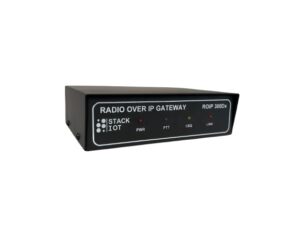Every successful operation in sectors like public safety, utilities, transportation and defense depends greatly on solid communication. Because organizations worry about dependability, distance and budget, Radio over IP (ROIP) is being chosen in place of standard radio.
Here, we’ll go over what ROIP systems do, how they differ from older radio systems and how you can pick the best one.
What does ROIP mean?
ROIP makes it possible to use radio communication through IP links like the internet or private networks. It takes the audio from radios, digitizes it and sends it over the internet just like VoIP does.
What Makes ROIP Special?
It takes audio sounds and shares them on the internet using IP.
- Permits people to connect over several miles without relying on radio towers.
- Enables connection with other kinds of IP devices
It is very useful for wide-area communication because it uses the internet and existing networks which cut costs.
Learning about Traditional Radio Systems
Radio frequency (RF) is used for radio signals in old-style communication networks. These protocols send signals electronically, either analog or digital and they depend on dedicated devices for operation.
- Transmitting antennae in radio base stations
- They need antennas and towers crucial for their work.
- Repeaters
- Frequencies given by the government
Yet, these systems are dependable, though their range is limited, a lot of permissions are needed and the setup and maintenance is costly.
ROIP vs Traditional Radio Systems: A Comparison
Here’s a side-by-side comparison of the two technologies:
| Feature | ROIP Systems | Traditional Radio Systems |
| Coverage | Global (via IP network) | Limited by RF range |
| Infrastructure Cost | Lower (uses existing IP) | High (requires towers, repeaters) |
| Scalability | Easily scalable | Difficult and costly to scale |
| Maintenance | Remote diagnostics possible | On-site maintenance required |
| Interoperability | High (connects diverse devices) | Often limited |
| Latency | Slight delay due to digitization | Real-time minimal delay |
| Security | Encrypted network communication | Varies by system type |
Advantages of ROIP Systems
If you work in an organization that operates over a large area, a radio over IP system can bring you a number of advantages.
What makes ROIP beneficial?
Global communication among various teams can be supported using satellites.
- Lower Expenditures: Minimizes how much is spent on networks and computers
- Remote Access: People can log in to Team meetings from any location with apps or computers
- Interoperability assists in linking devices, frequencies and regions for better communication
- It is simple to expand communication networks without needing to spend a lot.
Challenges often faced with ROIP Systems
Still, there are a few matters you should keep in mind when selecting ROIP systems:
- Needs five bars: Stable internet is very important
- Latency: Not much delay from sending data via packets
- The need for data privacy demands encrypting all data and using secure networks.
- Need for Training: Some teams may have to get used to the new digital systems.
When to Use Traditional Radio Systems
Traditional radio systems can be applied in different times and situations. There are situations where standard radio systems are still the best option.
- Remote or Rural Areas: Where network infrastructure is unreliable
- Real Time Communication requires a link that is free of any significant delays.
- Simple Environments: Small crews on a budget and with straightforward needs
The Best Applications for ROIP
The use of ROIP is especially effective in enhancing communication in the listed sectors:
- Public Safety: There should be smooth cooperation among police, firefighters and EMS workers.
- Transportation and Logistics: Live updates are available to individuals working in fleet and logistics
- Ensure that there are connections between power plants, grids and field technicians
- In the oil and gas industry, make sure offshore teams stay in regular contact.
- Systems in the government and military need to be secure, interoperable and strong enough for long-distance communication
Deciding Which System You Should Use
When selecting a radio system, what you need and the environment play a big role. You should think about a range of important factors.
- Location: Is your company active only within your country or around the world?
- Does your country have enough resources to bear extensive infrastructure expenses?
- Do you have your internet connections strong and steady?
- How important is securing data within internet of things?
- Will the size of your business increase?
️ Read more :- See why industry leaders trust our Pick to Light System. Click here for complete details!
Conclusion
Today’s operations make room for both ROIP and traditional radio communication systems. Should you want to cover the world, enjoy flexibility, and keep costs down, ROIP is a great choice. Still, traditional systems are preferred when people need zero latency or little or no internet access.
If you want to update your communications network with handy ROIP technology, check out the services that StackIOT has to offer.
FAQs
1. What does ROIP refer to?
Using ROIP, radios connect over IP networks by turning their audio into digital data.
2. Is ROIP a better choice than using regular radio?
Most organizations do require it. ROIP gives you access to a larger reach, allows your network to scale well, and does so at a lower expense.
3. Are older radios able to work with ROIP?
Yes. If you have the suitable gateways and software, you can add your existing radio hardware to ROIP systems.
4. Is using ROIP secure?
When encryption, firewalls, and right network settings are applied, data transmission is safe.
5. Is the use of the internet necessary for ROIP?
Yes. ROIP systems need either a public internet or a private IP network to function.




